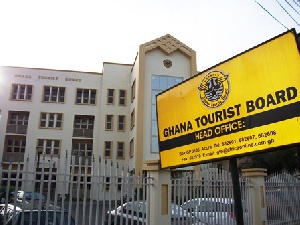The Ghana Tourism Authority (GTA) has held a sensitisation workshop for hoteliers and caterers on implementation of the tourism levy in Accra.
The workshop, according to Sampson Donkor -- Deputy Chief Executive in charge of Finance and Administration at the authority -- was to inform stakeholders about new transformations in the GTA to enable the agency execute its new mandate as an authority.
The Fund, he said, is to stimulate accelerated development of the sector in order to reap the identified benefits from the tourism industry.
The Fund comprises seed capital from government, 1 percent tourism levy payable by patrons, donations, grants and money earned by the promotion of any project -- but currently the 1 percent tourism levy is the main target.
The levy became operationalised in October 2012 and its collection applies to every enterprise in the industry.
Mr. Donkor noted that the fund is to be applied in marketing and promotion of tourism, capacity building and development of infrastructure, tourism education and training, and tourism trade-oriented activities for development of the sector.
He said some challenges associated with the Fund include irregular payment by a number of certified enterprises, delayed payment of collected levies, no reconciliation of levy collection by tourism enterprises as against payments, and units not charging the one percent tourism levy across revenue streams.
He said in order to address these challenges measures to recall outstanding levy payment from defaulters have been taken, and demand notices have also been served to defaulting hotels in the region; and as well as a software has also been developed to establish a reliable data base of all enterprises operating in the country.
He added that the tourism levy collection since its introduction has been able to cover over 95 percent of the accommodation and catering service in the industry, adding that travel-trade is the next sector the levy will be introduced to.
He said the sector’s survival depends on the levy, and as such it is important for the GTA to organise the workshop to render the state of the accounts to stakeholders as well as introduce to them the current challenges in collection.
Mr. Donkor said some stakeholders do not understand the tourism levy, and as such are not collecting them effectively; meanwhile others are collecting but not paying into the accounts, hence the need for a sensitisation workshop.
“The tourism levy fund was launched more than two years ago. But we have realised that there are some challenges even for the visitors who are supposed to pay. We feel that this is the time to come back to the people and then go through what we have done so far, listen to their challenges and help resolve them, so we can help collect the funds correctly.
“We do not want to introduce enforcement of the law, LI 2185, before education. The law states that if you do not collect the levy or collect and do not pay -- and don’t keep proper books -- it is an offence. We want to make sure everyone understands the full consequences before we get into action through court actions and arrests,” he said.
Business News of Wednesday, 3 December 2014
Source: B&FT













